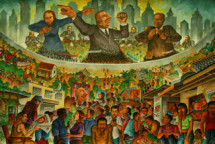Ideas into movement
Boost TNI's work
50 years. Hundreds of social struggles. Countless ideas turned into movement.
Support us as we celebrate our 50th anniversary in 2024.

How do Malawi's politicians exploit the frequent drought-induced food crises for their own political gains?

Malawi, an African republic largely relying on smallholder production, has a longstanding authoritarian tradition. Frequent, devastating droughts have hit the rural population of Malawi hard. In the face of these adverse climatic conditions, political leaders have managed to gather popular support through the concerted application of fertilizer subsidies. While many have hailed the program for its contribution to improving food security, others have criticized the clientelist character of the system.
This paper, using a political economy approach, traces the development of agrarian populism in democratic Malawi, a political strategy that attempts to create alliances with small-scale farmers by concrete and symbolic acts. Considering the perpetuation of bitter poverty, the unjust dual land ownership structure, and Malawi’s peripheral role in the global economic order, the analysis points to the limited effectiveness of the populist policies in alleviating the grievances of the rural population. Nevertheless, the agrarian populist strategy seems to strengthen authoritarian modes of rule and to quell resistance to exploitative practices.
This paper was presented at the Emancipatory Rural Politics Initiative (ERPI) 2018 Conference: "Authoritarian Populism and the Rural World"